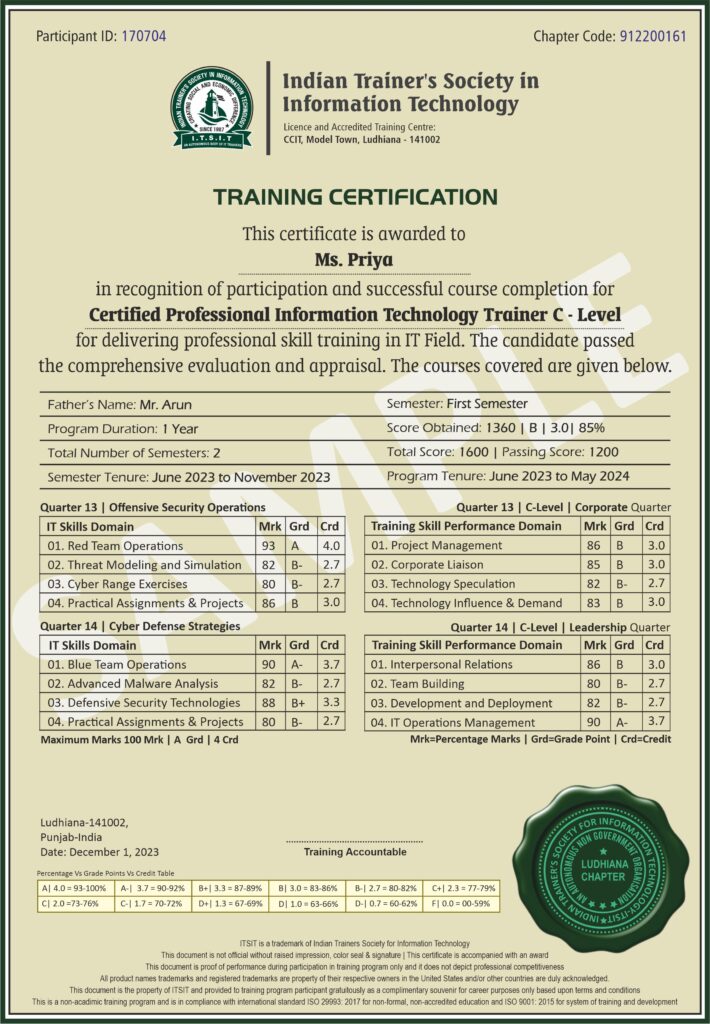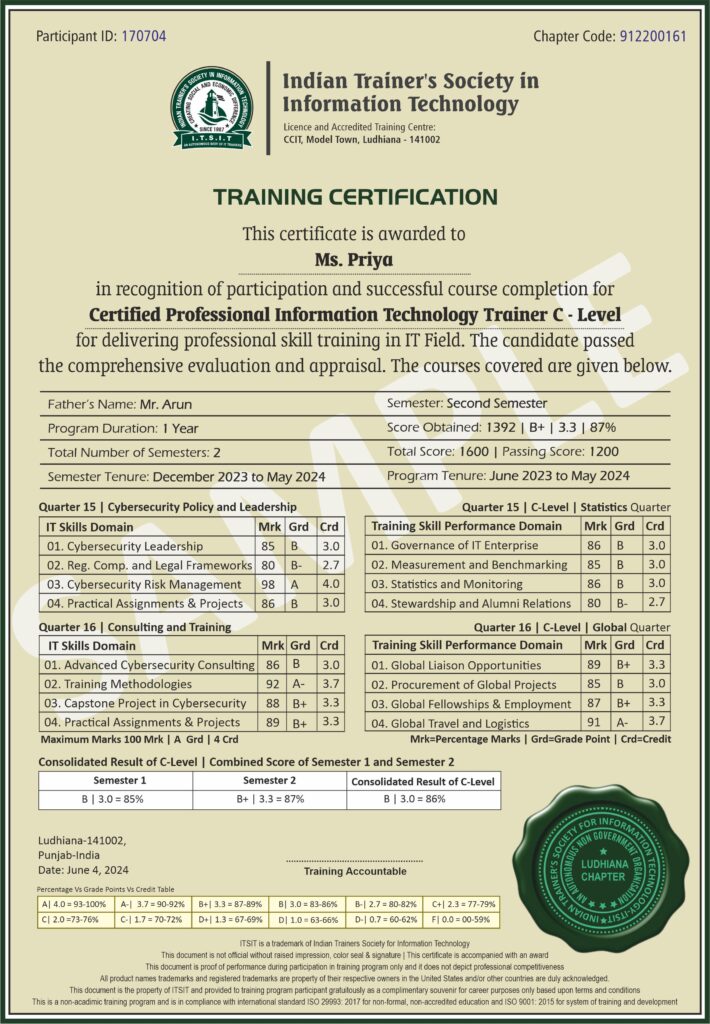C - Level | TOT Program
The C-Level represents the final and most advanced stage of the Training of Trainers (TOT) program, focusing on preparing participants for leadership roles in the field of cybersecurity. This level is designed to develop expert-level skills in offensive and defensive security, policy-making, risk management, and consulting. The intention is to produce cybersecurity professionals who can lead cybersecurity teams, develop strategies, and mentor the next generation of cybersecurity professionals. Participants at this stage will focus on high-level cybersecurity challenges and executive roles within the industry.
Duration
1 Year
Eligibility
B.Tech | MSc IT | M.Tech | PHD
Format
Offline
Outcomes
Skill Certificate
C-Level Semester 7
Semester 7 introduces participants to advanced offensive security and defensive strategies. The focus is on offensive operations such as red team exercises and threat modeling, alongside defensive measures like blue team operations and advanced malware analysis. The purpose is to ensure that participants can lead both offensive and defensive cybersecurity initiatives. The intention is to develop professionals capable of handling complex cybersecurity challenges in high-risk environments, whether simulating attacks or protecting systems from sophisticated threats.
13 Quarter - Offensive Security Operations
Quarter 13 focuses on advanced offensive security strategies, including red team operations and threat modeling. The purpose is to equip participants with the skills to simulate sophisticated cyber-attacks and assess the defense mechanisms of organizations. The intention is to create experts capable of leading offensive cybersecurity teams, improving security postures, and defending against advanced threats.
Courses in Quarter 13:
- Red Team Operations
- Threat Modeling and Simulation
Cyber Range Exercises
14 Quarter - Cyber Defense Strategies
Quarter 14 shifts focus to advanced defensive cybersecurity techniques, particularly blue team operations and malware analysis. The purpose is to prepare participants to lead defensive efforts against cyber threats, ensuring that they can effectively analyze and counteract malware. The intention is to build a strong foundation in defensive security technologies, enabling participants to safeguard critical infrastructures from persistent threats.
Courses in Quarter 14:
- Blue Team Operations
- Advanced Malware Analysis
- Defensive Security Technologies.
C-Level Semester 8
Semester 8 concentrates on leadership, policy-making, and consulting in cybersecurity. Participants will focus on developing cybersecurity policies, managing organizational risk, and ensuring regulatory compliance. The purpose is to train cybersecurity leaders capable of creating strategies and leading teams at an organizational level. The intention is to equip participants with the skills to consult on cybersecurity matters, manage teams, and provide expert training and guidance to future cybersecurity professionals.
15 Quarter - Cybersecurity Policy and Leadership
Quarter 15 emphasizes the development of cybersecurity leadership skills, focusing on policy-making, risk management, and regulatory frameworks. The purpose is to prepare participants to take on executive roles in cybersecurity leadership. The intention is to ensure that participants can manage cybersecurity teams, develop strategies, and ensure compliance with legal and industry standards.
Courses in Quarter 15:
- Cybersecurity Leadership
- Regulatory Compliance and Legal Frameworks
- Cybersecurity Risk Management.
16 Quarter - Consulting and Training
Quarter 16 prepares participants for high-level consulting and training roles. This quarter focuses on providing advanced consulting services and developing training methodologies for cybersecurity professionals. The purpose is to ensure participants can effectively lead cybersecurity training programs and consult on complex security issues. The intention is to prepare participants to be experts in both teaching and consulting, ready to shape future cybersecurity strategies and professionals.
Courses in Quarter 16:
- Advanced Cybersecurity Consulting
- Training Methodologies for Cybersecurity Professionals
- Capstone Project in Cybersecurity.
C-Level | Semester -1 | Transcript
C-Level | Semester -2 | Transcript


Intended Outcome of C-Level
The C-Level of the Training of Cybersecurity Trainers (TOT) Program aims to produce cybersecurity leaders capable of managing large-scale security operations, developing strategic security policies, and providing expert consulting services. By the end of this level, participants will have mastered offensive and defensive security operations, developed leadership and consulting skills, and gained the ability to train and mentor future cybersecurity professionals. Graduates of the C-Level will be equipped to lead cybersecurity teams, design organizational security strategies, and provide expert guidance on regulatory compliance and risk management.
- Master advanced offensive and defensive cybersecurity techniques.
- Lead large-scale cybersecurity operations and strategic security initiatives.
- Develop and implement cybersecurity policies for organizations.
- Manage cybersecurity risk and ensure compliance with regulatory frameworks.
- Provide expert consulting on complex cybersecurity challenges.
- Train and mentor the next generation of cybersecurity professionals.
- Prepare to assume executive roles in cybersecurity leadership and management.
